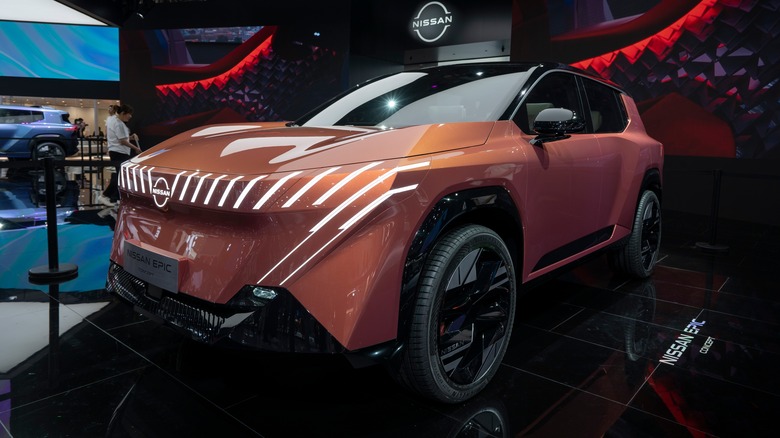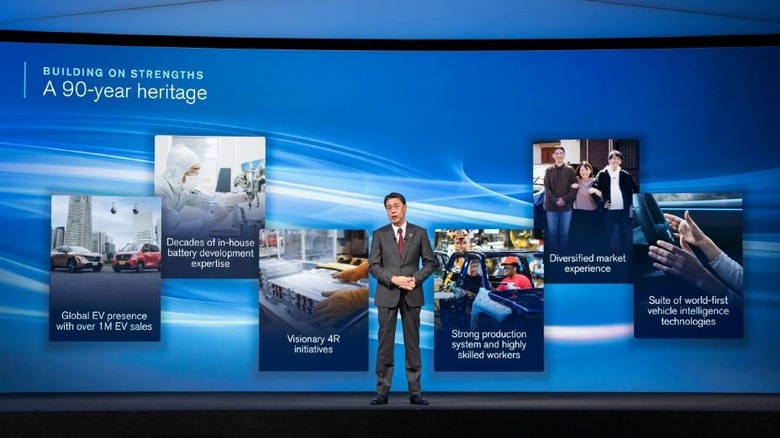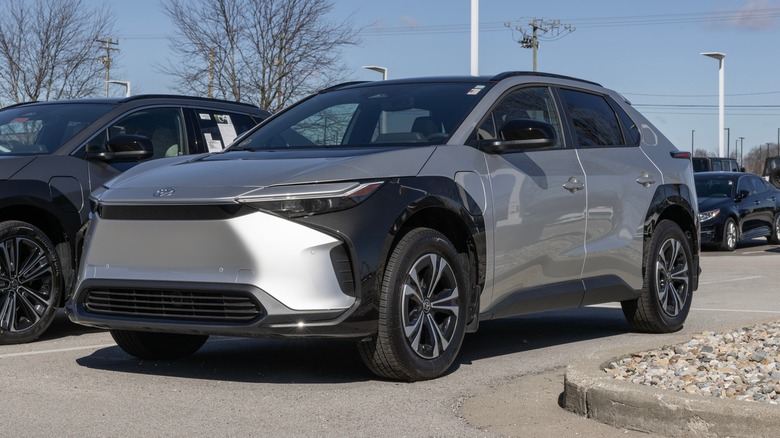Why Nissan Decided To Stop Investing In Gas Engines
While Toyota, Subaru, and Mazda, three of the most reliable car brands, agreed to create the next generation of internal-combustion engine (ICE) vehicles, Nissan is taking a different approach. Instead of further developing gas-powered vehicles, the Japanese automaker is zeroing in its focus on EVs. As Nissan's Senior Vice-President and Chief Planning Officer for the AMIEO (Africa, Middle East, India, Europe, and Oceania) region Francois Bailly told Drive, "Our future is EV."
Nissan's likely trying to keep up with the stricter emissions regulations different countries are putting in place for automakers. Europe, for example, has set a regulation that cars and vans can emit no more than 93.6 g CO2/km and 153.9 g CO2/km, respectively, between 2025 and 2029. Those restrictions get tighter between 2030 and 2034 where the European Union expects cars and vans to produce no more than 49.5 g CO2/km and 90.6 g CO2/km, respectively. The UK even set a 2035 deadline for automakers to exclusively sell zero emission vehicles.
In March 2024, Nissan presented an electric roadmap that promised to produce cheaper EVs. This plan lays out the brand's intention to build new EVs since the Leaf and Ariya are, as of this writing, its only electric cars.
Nissan's Arc plan lays out its goals for EV
Nissan is calling the plan it presented in March 2024 "The Arc," and it details the automaker's strategy to grow while simultaneously preparing for a transition to EV. The plan is two-pronged. First, Nissan aims to sell an additional 1 million vehicles each year, including those powered by electric and ICE. This, Nissan posits, should increase its profit margin by 6% by the end of 2026. If all goes according to plan, that profit margin will support the second part of the strategy, which is to transition to exclusively selling EVs.
The manufacturer wants to make sure 40% and 60% of its global portfolio is comprised of EVs by 2026 and 2030, respectively. That will start with the introduction of 16 new EVs over the next three years, and then another 34 by the end of the decade. Throw in some strategic partnerships and newer technologies for EVs and it starts to make sense why Nissan stopped investing in gas engines.
Nissan's plan goes on to discuss the company's strategy for improving the affordability of EVs for consumers, since all will be for nothing if people can't afford its new EV cars. "By developing EVs in families, integrating powertrains, utilizing next-generation modular manufacturing, group sourcing, and battery innovations," Nissan wants to reduce the price of next-generation EVs by 30% compared to the current cost of its Ariya, according to a Nissan press release.
What are some of Nissan's competitors doing?
Building fully electric cars isn't the only way automakers can pursue decarbonization, and three other Japanese automakers are setting out to prove that. Toyota, Mazda, and Subaru have joined together to invest in alternative fuels that can work in ICE vehicles. They're going to look at biofuels, liquid hydrogen, and synthetic fuel, along with hybrid systems for engines designed to be more efficient and produce fewer tailpipe emissions. Toyota's CEO Koji Sato is more about evolving current technologies to achieve carbon neutrality, a stark contrast to Nissan's approach.
However, despite alternative fuel sources like biofuel producing less carbon dioxide than diesel or other petroleum-based counterparts, it doesn't mean they produce zero carbon emissions. So unless the automakers can persuade the EU to change its ban, they will have to focus efforts in other markets as well.
This can prove to be beneficial for, and considerably easier, for Nissan in the long run. Nissan's decision to transition directly from ICE vehicles to EVs can potentially give it room to worry about alternative fuels in the future if the automaker so chooses. For now, the company is doing something right: Nissan's EV sales sit ahead of Toyota's in 2024's first quarter, selling 4,142 units of its Ariya crossover compared to Toyota selling 1,897 of its bZ4X models.


